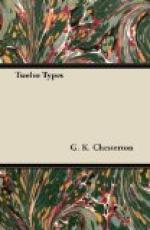This value which we have above suggested, unquestionably belongs to the Tolstoians, who may roughly be described as the new Quakers. With their strange optimism, and their almost appalling logical courage, they offer a tribute to Christianity which no orthodoxies could offer. It cannot but be remarkable to watch a revolution in which both the rulers and the rebels march under the same symbol. But the actual theory of non-resistance itself, with all its kindred theories, is not, I think, characterised by that intellectual obviousness and necessity which its supporters claim for it. A pamphlet before us shows us an extraordinary number of statements about the New Testament, of which the accuracy is by no means so striking as the confidence. To begin with, we must protest against a habit of quoting and paraphrasing at the same time. When a man is discussing what Jesus meant, let him state first of all what He said, not what the man thinks He would have said if he had expressed Himself more clearly. Here is an instance of question and answer:
Q. ‘How did our Master Himself sum up the law in a few words?’
A. ’Be ye merciful, be ye perfect even as your Father; your Father in the spirit world is merciful, is perfect.’
There is nothing in this, perhaps, which Christ might not have said except the abominable metaphysical modernism of ‘the spirit world’; but to say that it is recorded that He did say it, is like saying it is recorded that He preferred palm trees to sycamores. It is a simple and unadulterated untruth. The author should know that these words have meant a thousand things to a thousand people, and that if more ancient sects had paraphrased them as cheerfully as he, he




